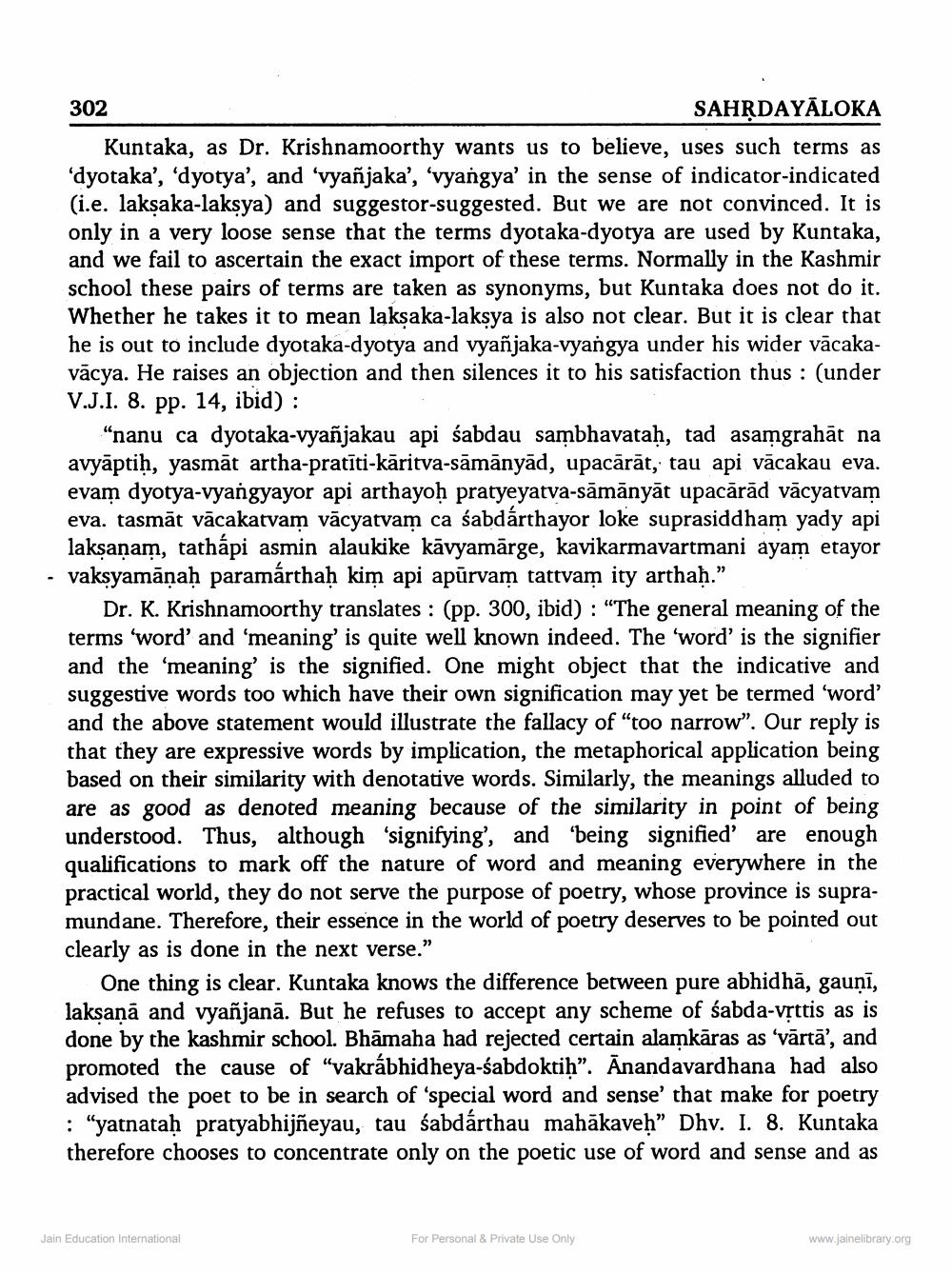________________
302
SAHRDAYĀLOKA Kuntaka, as Dr. Krishnamoorthy wants us to believe, uses such terms as dyotaka', 'dyotya', and 'vyañjaka', 'vyangya' in the sense of indicator-indicated (i.e. laksaka-laksya) and suggestor-suggested. But we are not convinced. It is only in a very loose sense that the terms dyotaka-dyotya are used by Kuntaka, and we fail to ascertain the exact import of these terms. Normally in the Kashmir school these pairs of terms are taken as synonyms, but Kuntaka does not do it. Whether he takes it to mean laksaka-laksya is also not clear. But it is clear that he is out to include dyotaka-dyotya and vyañjaka-vyangya under his wider vācakavācya. He raises an objection and then silences it to his satisfaction thus : (under V.J.I. 8. pp. 14, ibid) :
“nanu ca dyotaka-vyañjakau api śabdau sambhavataḥ, tad asamgrahāt na avyāptiḥ, yasmāt artha-pratīti-kāritva-sāmānyād, upacārāt, tau api vācakau eva. evam dyotya-vyangyayor api arthayoh pratyeyatva-sāmānyāt upacārād vācyatvam eva. tasmāt vācakatvam vācyatvam ca śabdárthayor loke suprasiddham yady api
lakṣaṇam, tathápi asmin alaukike kāvyamārge, kavikarmavartmani ayam etayor - vaksyamāṇaḥ paramárthaḥ kim api apūrvam tattvam ity arthah.”
Dr. K. Krishnamoorthy translates : (pp. 300, ibid): "The general meaning of the terms 'word' and 'meaning' is quite well known indeed. The 'word' is the signifier and the meaning' is the signified. One might object that the indicative and suggestive words too which have their own signification may yet be termed 'word' and the above statement would illustrate the fallacy of "too narrow”. Our reply is that they are expressive words by implication, the metaphorical application being based on their similarity with denotative words. Similarly, the meanings alluded to are as good as denoted meaning because of the similarity in point of being understood. Thus, although 'signifying', and 'being signified' are enough qualifications to mark off the nature of word and meaning everywhere in the practical world, they do not serve the purpose of poetry, whose province is supramundane. Therefore, their essence in the world of poetry deserves to be pointed out clearly as is done in the next verse.”
One thing is clear. Kuntaka knows the difference between pure abhidhā, gaunī, laksaņā and vyañjanā. But he refuses to accept any scheme of śabda-vsttis as is done by the kashmir school. Bhāmaha had rejected certain alamkāras as 'vārtā', and promoted the cause of "vakrábhidheya-sabdoktih”. Anandavardhana had also advised the poet to be in search of 'special word and sense that make for poetry : "yatnatah pratyabhijñeyau, tau śabdárthau mahākaveh” Dhv. I. 8. Kuntaka therefore chooses to concentrate only on the poetic use of word and sense and as
Jain Education International
For Personal & Private Use Only
www.jainelibrary.org




